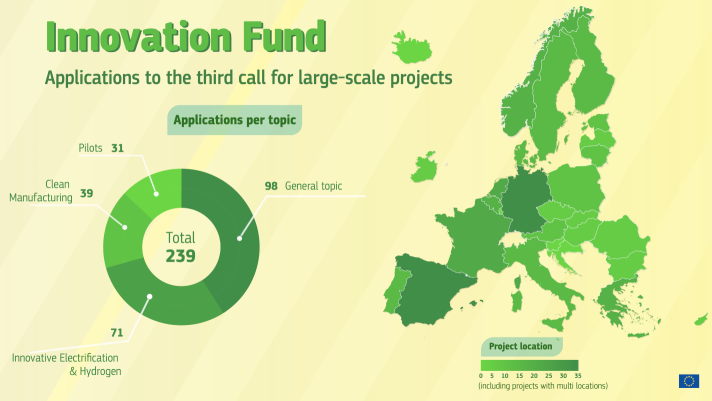The European Commission has received 239 applications from innovative clean tech projects, in response to the third Innovation Fund call for large-scale projects. The project proposals applying to four different topics will now compete for a total call budget of €3 billion. The Innovation Fund budget comes directly from the EU’s Emissions Trading System (ETS).
The highest number of applications were submitted under the topic of general decarbonisation (98), followed by innovative electrification in industry and hydrogen (71), clean tech manufacturing (39), and mid-sized pilots (31).
This large-scale call has a very wide geographical coverage, with 25 eligible countries represented. Taken together, the proposed projects would achieve an expected reduction of greenhouse gas emission of 2.4 billion tonnes CO2 equivalent. The total funding requested amounts to EUR 18 billion, which represents around 6 times the budget available.
The number of applications in the main Innovation Fund categories are:
- 42 for renewable energy
- 26 for energy storage
- 171 for energy-intensive industries, including carbon capture, use, and storage

Applications to the third call for large-scale projects
The applications received confirm that the European industry can deliver on the RePowerEU objectives. Hydrogen projects represent about a quarter of all applications received across all topics, demonstrating the investment needs in this sector. 39 proposals on clean tech manufacturing prove that the European Union can scale up its manufacturing capacity and be a strong competitor in the clean tech race. The Innovation Fund is a crucial instrument to support European front-runners and to scale up the EU’s manufacturing capacity for net-zero technologies and to achieve the objectives of the Net Zero Industry Act.
Next steps
The next step is to check the admissibility and eligibility of the submitted applications. Proposals that pass this check will be evaluated by independent external experts based on their potential to avoid greenhouse gas emissions, their innovation, maturity, potential for scaling up, and cost efficiency.
The Commission will inform the applicants and publish the results of the evaluation in the second half of July 2023. CINEA will invite successful applicants to prepare their grant agreements. Grants will subsequently be awarded by the end of 2023. Rejected proposals with potential to improve their maturity may be offered Project Development Assistance by the European Investment Bank.
Further calls and auctions are coming up under the Innovation Fund: The third call for small-scale projects, amounting to a total budget of €100 million, is expected to launch on 30 March.
As announced in the EU Green Industrial Plan and European Hydrogen Bank Communication accompanying the Net Zero Industrial Act, the Commission will launch in autumn 2023 the first EU-wide auction for renewable hydrogen production.
Background
Funded by revenues from the auction of emission allowances from the EU’s Emissions Trading System, the Innovation Fund aims to create the right financial incentives for companies and public authorities to invest now in the next generation of low-carbon technologies and give EU companies a first-mover advantage to become global technology leaders.
The Innovation Fund is implemented by the European Climate, Infrastructure and Environment Executive Agency (CINEA), while the European Investment Bank provides project development assistance to promising projects, with the goal to increase project maturity for subsequent Innovation Fund calls.